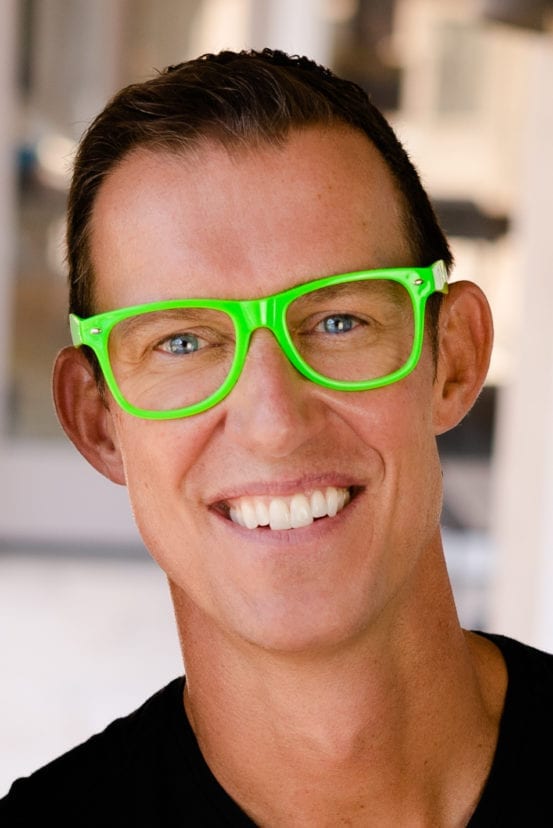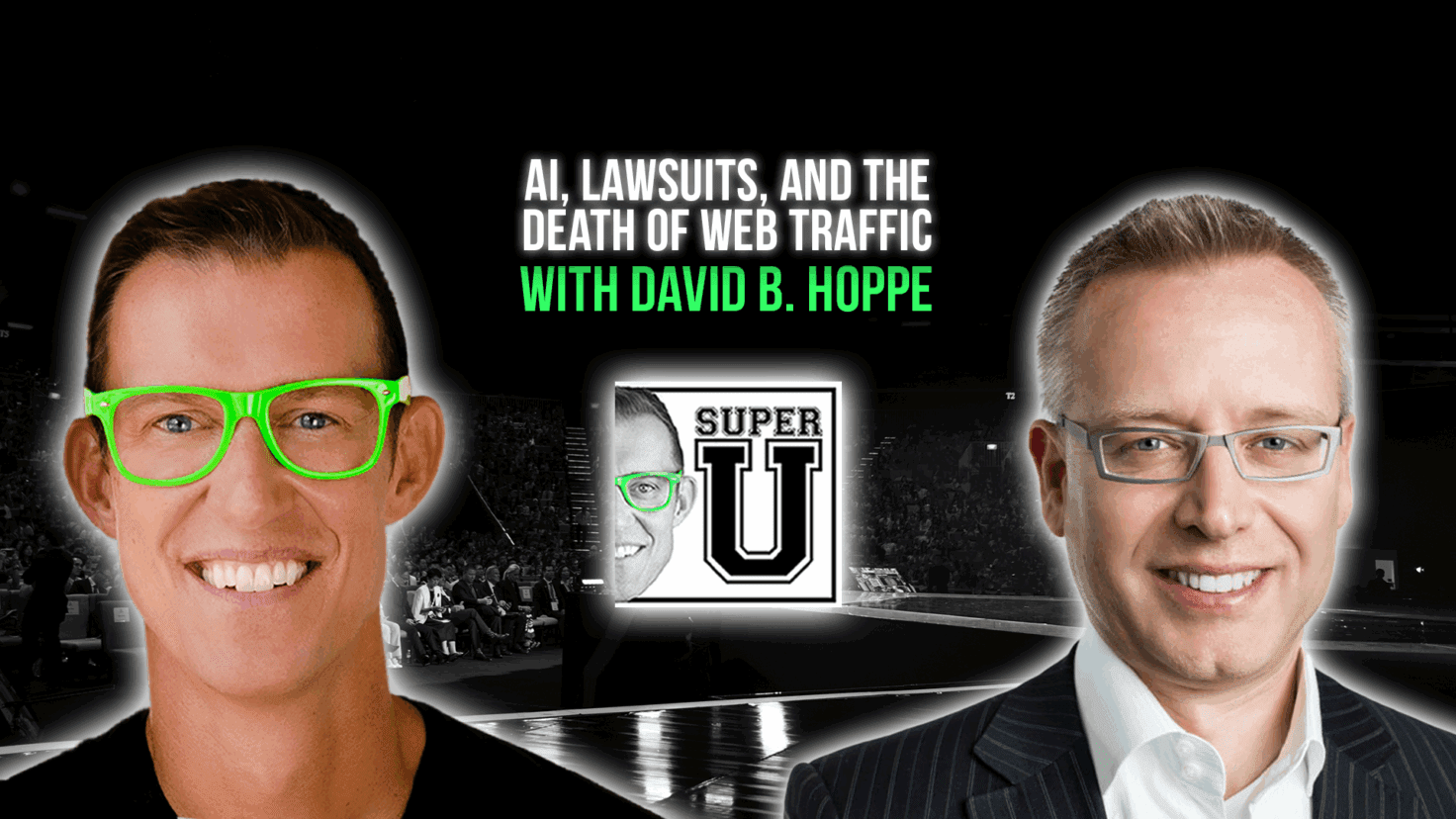Super U Podcast | 7 Super Tips with Alex Hormozi
Alex Hormozi is an American entrepreneur. He started as a management consultant in the public sector then left that career to pursue a career in fitness starting his first gym at age 23. He scaled his small gym chain from 0 to 6 locations in three years. Over the next two years, he and his wife started flying around the country turning gyms around. Their large success, however, came from packaging and licensing his boutique gym model to 5000+ gyms around the world. They then started a supplement and software company to support that base of gyms. They sold a 66% stake in the company in 2021 at $46.2M to American Pacific Group. They then started Acquisition.com as a holding company for their private investments. The private equity firm focuses on making minority investments into cash flow positive growing founder-owned businesses. They then scale those businesses. As of 2023, their portfolio of 16 companies generates $200,000,000 per year and growing. The couple now has shifted their mission to making real business education available to everyone. They fulfill this by making content across social media and publishing books and free courses for entrepreneurs.
5x #1 Bestselling Author and Motivational Speaker Erik Qualman has performed in over 55 countries and reached over 50 million people this past decade. He was voted the 2nd Most Likable Author in the World behind Harry Potter’s J.K. Rowling. Qualman is also the inventor of the bestselling board game Kittycorn.
Need a sneak peek? Below are the main takeaways from the episode.
Super U Podcast | 7 Super Tips with Alex Hormozi
Tip #1:
“These things take time, right? I knew that when I was younger, in the entrepreneurial game. I was very obsessed with fast wins fast wins fast. And what can we do this week? And what can we do this month rather than thinking 10 years out? 20 years out and the thing is, is that when I learned this lesson from Andrew Chang, who owns Panda Express and he lives in the building above me, he actually owns this entire building, which he bought for I think like 150 million and he owns the building next to us, which he bought for 5.6 billion big dudes and he owns 2600 locations of Panda Express and he owns them all 100% He has no franchisees no licenses and when asked on an interview, what the keys to success were there were two themes that came out one he said a customer was asked absolutely Love your product. And number two is that big things take time, right? It took him 45 years, and he still continues to grow to this day. And the majority of the growth has happened in the last, you know, five years or so this year, you open up 600 locations of those two of those 2600. So a huge chunk happens near the end. And that depth of expertise takes time to build because remember, we’re competing, it’s other people who’ve also been doing this for a long period of time. And the one thing that we can take to our advantage is if we’ve just been doing this longer, right, and we get these compounding results that happen over a long period of time. And so I think rather than making this a patient’s platitude thinking of this as what can I do for a very, very long period of time, because the only things that will be very big will take a long time. And I must be motivated to not change my course, or see some shiny object that’s going to take me away from my overarching vision or goal. And so I think when I started thinking this way, the companies that I had continued to grow better with higher quality people and made higher quality decisions because it wasn’t about the short when it was just is this going to matter in 10 years? And what are the few things that don’t matter that long period of time, and then let’s ruthlessly eliminate everything else and just focus on those things.”
Tip #2:
“There’s a setting in our community called to do the boring work. And a lot of times we don’t confront the work that must be done because it’s not exciting or sexy, and it feels somehow, like it’s beneath us, you know, prospecting and doing 100 dials a day can feel tedious, you know, posting and repurposing the same content across lots of media sources can feel tedious, you know, reaching out to people you know, and asking them if they know someone who might be interested in your products or services might feel tedious, or creating, you know, 100 different ad variations with different hooks and headlines can seem tedious, it’s very easy to understand very hard to do, mostly because people don’t have the discipline and the work ethic to go through the boring work, which kind of leads to the second one here, which is that there’s a saying between my closest friend and I Dr. Kashi violence is the answer. Sometimes when you have this outcome that you must achieve in your life, because of the goals and insecurities that we have set upon ourselves. Just being violent with the level of activity that we are doing, ultimately gets us much closer than, you know the nuances and the skill. Sometimes we like to project and pretend to matter more than just physically doing a sheer higher volume of work. Number three is that if you do more than you’re doing right now, you will get more than you currently have. And that is a promise that you can take that to the bank. And number four is to do what matters most first. So right now you probably have lots of things that you know, fill up your day in the morning, all that kind of stuff. But the things there are only four activities that will actually generate more business for you period that is new. All right, number one is reaching out to people, you know, number two is posting to an audience that you know, number three is reaching out to people who don’t know one on one, and number four is advertising, right? Those are the four only four ways you can get new clients. And so if you’re not doing one of those four things, and you’re struggling to get customers, you’re not doing lots of those four things as your primary activities, then that is probably one of the reasons that you don’t have the number of customers that you wish you had. All right. And so what I want to do is take this quick moment to introduce an equation that I’ve thought a lot about, but it’s V times s times d. So volume time scale times time. And this is kind of a flywheel that feeds itself and I’ll get to the actual like wording behind this. But essentially, the more volume to do, the better you are at it, and the longer you do it, the more throughput you will ultimately have the more outcome, the more clients the more sales, and the more leads you will ultimately have from doing it. Alright, so let’s dive into this a little bit more. So in other words, this is basically just like pure foundational principles of logic, right? The more we do, the better we get, the better we did, the more we do because we like it because we’re better at it right? And the longer we do something, the better we get, the better we get, the longer we do it.”
Tip #3:
“When you make I am statements they are the strongest statements that you can make because they are deeply embedded beliefs about what you believe about yourself. And so, if you say I am this way, when you describe yourself when you meet someone new you meet a girl on a date and you’re like I am I have a short fuse right I have a temper I am disorganized I am not good with time I am not good with money I haven saying this right. But just to give you the types of things that people say all the time that do not serve them. Does this belief serve? If it does not stop saying it period and say something else, right? Or the very least if you feel compelled to have to describe this thing, then say I have a tendency, or I struggle with behaviors that are this way, rather than I am, number one. Number two, be incredibly weary of the superstitions and routines and religion that you adhere to, that you claim is the source of your productivity, creativity, alertness, and mental well-being subject to, you know, happiness, whatever it is, or the converse of that, if you lack it, the threats or the punishments that you speak over yourself if I am not, I am agitated, I have a short fuse, I can’t focus, I’m not productive, I don’t have energy. All of these things are just weaknesses that you literally build into yourself. So stop.”
Tip #4:
“Things that I live by is that we’re one decision away from changing our lives forever, right? You’re one decision away from drinking and getting killed in a car crash car accident, you’re one decision away from, you know, cheating on your spouse and destroying your marriage, you know, you’re one, one terrible comment away from destroying your child, right? And you’re also one decision away from destroying your business if you so chose. So decisions are the wellspring of life, or at least the train track splits of where we’re going to end up, alright, learning to make the decisions is an important concept. But believe it or not, for this video, what I’m going to focus on is actually the environment under which to make the decision during this process. One of the things that was very frustrating for me, was that this decision took me about 12 months to make, and I’ll make, I’ll explain what the decision wasn’t in another video in the future. But it’s safe to say like it was, it was a hugely impactful decision in my life financially. And otherwise, one of the difficulties that I was having is that the information that I had was not changing, and yet my decision of which way to go continued to falter. Alright, so I kept ping pong back and forth, and back and forth, and back and forth. And so I was like, It’s not my decision-making process, right? And the data that I have to make this decision is unchanging. And yet, on different days, I would have different outcomes, which to me is a big red flag danger alert in terms of like, the leading indicator of a bad decision. Mind you, as a quick caveat to this, this is not how you need to make all the decisions in your life, I would say that you should find and use this process for the most important decisions you make in your life. Who are you going to marry? Where are you going to live? What are you going to work on? Right? What are you going to like? Those are the decisions are we going to make this big strategic change in our business? Those are big, irreversible decisions. And that’s the key for me is that if a decision is irreversible, comma, and has downstream consequences, then those are the ones that take more time to analyze. All right. Now, here’s the piece that I was missing in my equation for making this decision. So I want to share with you all right, one of the key pieces of how we decide is the brain chemistry that is going on. So whether you have lots of dopamine or lots of serotonin that are circling around in your brain will ultimately affect how you make decisions, believe it or not, we are 100%, emotional decision-makers. The thing is, what we want to do is control the extent to which the emotions control our decisions. Alright, that’s the key point here. If you don’t acknowledge that emotions weigh into all of your decisions, even your quote, rational ones, you are lost. All right? What you can do is first identify when you are feeling emotional, and a lot of guys feel like this is like a fufu term. If you’re angry, it’s emotional. If you’re insecure, that’s emotional. Like there are other emotions besides being a pansy. If you have emotions, it decreases the speed with which you make decisions and the stakes love a rush decision. You can say mistakes love a rushed decision. It’s one of the credos that Leila and I live by the environment under which we make this decision is important. Now, we have to acknowledge the biases that we have, here’s where emotions get even worse, you have two biases that you have to fight against. One is confirmation bias, which is your emotional soup and your brain is going to say this is what I want, because this is how I feel safe, then your logical brain will search out reasons or data to support that data. Right? It’s like making an argument to yourself. The problem is, you may change your argument, but it’s not going to change reality, which means that the decision can be good or bad based on the soup that we started as the predisposition towards how we’re going to gather data. The second is conviction bias, which is how convicted in mind in this thing or this decision, the more you believe in it, or the more you want the positive outcome to occur, the more you will purposefully blind yourself because you want to save your ego and how you feel about yourself because you it makes you feel good to think about this positive outcome, but it does not affect the percentage likelihood that it actually occurs in the real world. Just because you see other people is because you can be rational about others. You see other people make these terrible decisions and you think to yourself, why on God’s earth that they make those decisions? When in reality that person is you and it’s other people we’re looking at you.”
Tip #5:
“One of the things that I get asked a lot when I go on the rare occasions that I go out in public is, you know, how do I make more money? How did you get started? What should I be investing in? And I think that it’s really important to understand that if someone’s able to achieve something faster than you, they’re using the same resources that you have from a time standpoint. And so it just means that they’re allocating their attention in places that they’re getting disproportionate returns on it, right? And so the objective is, how can we find the biggest ROI buckets that we put our time into so that we can extract as much value as humanly possible as fast as possible? And so my belief in this is that information is the single best investment that you can have. Because information is the only thing that buys you time. So that makes sense. A lot of people want to go faster, but then they don’t want to spend money on learning how to go faster. And that is the only thing that gets you from point A to point B in a shorter period of time. And so where it gets really interesting is how you acquire those skills. And so I’ll give you can I give you two like habits that I think have done really well for me in terms of acquiring skills. So the first thing is, like I was up today, at three o’clock in the morning, I’m usually in bed right now. So this is my amped voice. But I say that because I also know so I have a few billionaire friends who are, who are night owls. And so I don’t think it’s a morning thing. Specifically, I think it’s more important that you can always have four to five hours a day of uninterrupted time to yourself. The biggest breakthrough that I was able to have in my own life, from a business standpoint came when I was able to move the big pieces forward every single day because I started my day that way. And for me, that’s what I’m the most creative in the morning. And so that’s where I invest all of my time and acquiring skills.”
Tip #6:
“There’s three traits that people do when they looked at because they were trying to find Habits of Highly Successful People. And when they actually pulled apart, it’s not, you know, and I hope I’m not contradicting anything. But there are people who are really rich, who wake up really late and work really late. And those people really rich, who wake up really, really early. And there are people who are really rich, who eat really healthy, and people really rich, who drink cocoa and eat french fries every day. And so there are all these things that we want to make His truths, but there are easy examples that counter those things. So it’s like, what are the few things that are true, or at least that seems to be present in all of the situations? And it seems as though there were surprisingly few. And so the three common traits that they had, that they had found, we’re one that people have a superiority complex, they believe that better than others, and they believe that they deserve more than everyone else does and that they can accomplish big goals, right? So they have a bigger vision because they believe they deserve it, or whatever it is that they were able to identify that. The second thing that they identify is that they had crippling insecurity, which is a paradox of paradoxes, they feel they’ll never be enough. And they’ll always be measured against the things that they’ve achieved. And so you’ve got this crazy dynamic between them, they think they’re better than everyone, they think they deserve more, they want to go after this big hill, and at the same time, they fear they’ll never be good enough, or they’ll never actually achieve it, and they actually suck. And then the third piece, which kind of adds the beautiful mix of this is impulse control. And so they’re able to control their actions and focus on a single thing for an extended period of time. And so if you put those two things together, it’s like, you’ve got a big goal that’s pulling you this way, you’ve got this big fear that you were running away from, and then you’ve got impulse control to keep you focused on the one thing that matters, yes. And if you do that, if you are the type of person who has those traits, then you are very likely to be successful.”
Tip #7:
“Keep having fun. Because I mean, it would be like, if I had hit that at that point, you’d be like, keep doing it. Like everything you’re doing. You got here because you’re having a good time there. Just don’t lose track of that. Because in three generations, everyone’s just gonna forget that you’re alive. No one’s gonna remember your name. You’re not gonna be the greatest of all time because you did your job, someone else would be even better younger than you. And so like the only point of the game is to play, it would just remind me of something that I already know to be true, but it would just be from future me. Hopefully, he would just say it perfectly to my heart.”
Connect with Alex Hormozi:
Instagram: @hormozi
Youtube: https://www.youtube.com/@AlexHormozi
LinkedIn: https://www.linkedin.com/in/alexhormozi
TikTok: @ahormozi
Click here to subscribe and listen to the full episode.

To ensure you don’t miss future episodes, subscribe to our podcast by clicking here >> Super U Podcast. We hope these tips help unlock and unleash your inner superpower!
The Super U Podcast is hosted by #1 bestselling author and Motivational Speaker Erik Qualman.





